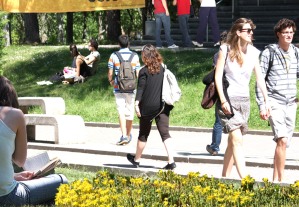Admission if you have started or finished university studies in your country
If you've already started a university course in another country and you wish to continue it in Spain, or if you did not obtain your degree after completing a university course in your country and you wish to continue the same or similar course in Spain.
You need to apply to have your studies validated (the subjects you have passed) to conform to partial Spanish university courses.
You will need to do this at the Spanish university that you are interested in enrolling in. The effects of the validation are solely academic, and enable you to continue your studies within the Spanish education system. These studies may lead to the award of a Spanish University degree.
What documentation will you need?
• Accredited photocopy of a current Spanish ID card, passport or resident's card.
• Official application form for validation, indicating your personal details, the subjects you have studied and passed, and details of the studies you wish to validate. (Many universities allow you to obtain this form online).
• Official course certificate with the subjects you have studied and passed, with the original stamp of the university of origin.
• Curriculum showing the subjects you want validated, with the original stamp of the university of origin.
• Syllabus of the course you started which shows its years of duration and the subjects it includes, with the original stamp of the university of origin.
Some universities also ask you to include other documents in addition to those mentioned above:
• Information on the marking system of the origin university, with the original stamp.
• Sworn declaration that you have not completed the studies you wish to validate.
We recommend that you check with each university for their specific access requirements, their procedures for recognising credits and the necessary documentation.
In order to validate partial studies a minimum of 30 credits is required for subjects corresponding to the course the student wishes to follow.
The documents must be official, diplomatically legalised or bearing the “Hague Apostille” (if your country is a signatory to the Hague Convention), and include an official translation into Spanish. Documents issued in European Union countries or in countries that are signatories to the agreement on the European Economic Space will not need to be legalised.
If, on the other hand, they need to be diplomatically legalised, they must have the following stamps and be submitted to the Ministry of Foreign Affairs:
• Stamp from the Ministry of Education in the country of origin for diplomas and certificates, and from the corresponding Ministry for birth and nationality certificates.
• Stamp from the Ministry of Foreign Affairs in the country where these documents were issued.
• Stamp from the Spanish diplomatic or consular delegation in the country of origin of the documentation.
• A stamp from the Legalisation Section of the Spanish Ministry of Foreign Affairs and Cooperation legalising the signature of Spanish diplomatic or consular representation.
Things to remember
Students who are not nationals of countries whose official language is Spanish may have to take a language test at the university.
If you meet all the requirements for admission, you will need to enrol within the period established for this purpose. If you receive a rejection, you can appeal before the Vice-rectorate of Students.
If you have finished your bachelor’s degree in another country (either EU or not) and you want to study another bachelor’s degree in Spain
If you have completed your university studies in a foreign university or centre of higher education, you have two options:
1. You can apply for your diploma to be certified as an official university degree in Spain.
2. You can apply for validation to conform to partial university studies in Spain (where possible – as this process takes into account the discipline of your original studies, and they may not have an equivalent in Spain). You should also note that you cannot validate studies that are not officially academically valid in the country of origin).
You cannot apply for both simultaneously. In other words, if you obtained a degree in another country, you can only obtain its validation to conform to partial studies in Spain if you have not requested your diploma to be recognised as an official university degree in Spain.
If your request to have your degree recognised is denied, you will then be able to apply for partial validation of your studies (with exclusions). But remember, in the studies you have completed for your degree have already been validated in order to continue your studies in Spain, you cannot obtain their certification after the fact.
You'll find more information on the following links for the Ministry of Education, Culture and Sport:
http://www.mecd.gob.es/educacion-mecd/areas-educacion/universidades/educacion-superior-universitaria/titulos/homologacion-titulos/convalidacion-parcial.html
http://www.mecd.gob.es/educacion-mecd/areas-educacion/universidades/educacion-superior-universitaria/titulos/homologacion-titulos.html
What is the difference between recognising the degree (“homologación”) and validating your studies (“convalidación”)?
Certification always refers to a diploma or degree; in other words it recognises the academic level of the course or studies you took in a foreign education system and its equivalence with a diploma or degree in the Spanish system.
Validation refers to a specific course of study. In other words, it is the official recognition, for academic effects, of the validity of higher studies followed abroad, regardless of whether they resulted in the award of a degree.
What is the Hague Apostille and which countries signed the Convention?
You can find information about the Hague Apostille and the answers to all your queries at the following link:
http://www.mjusticia.gob.es/cs/Satellite/es/1200666550200/Tramite_C/1215326297910/Detalle.html







